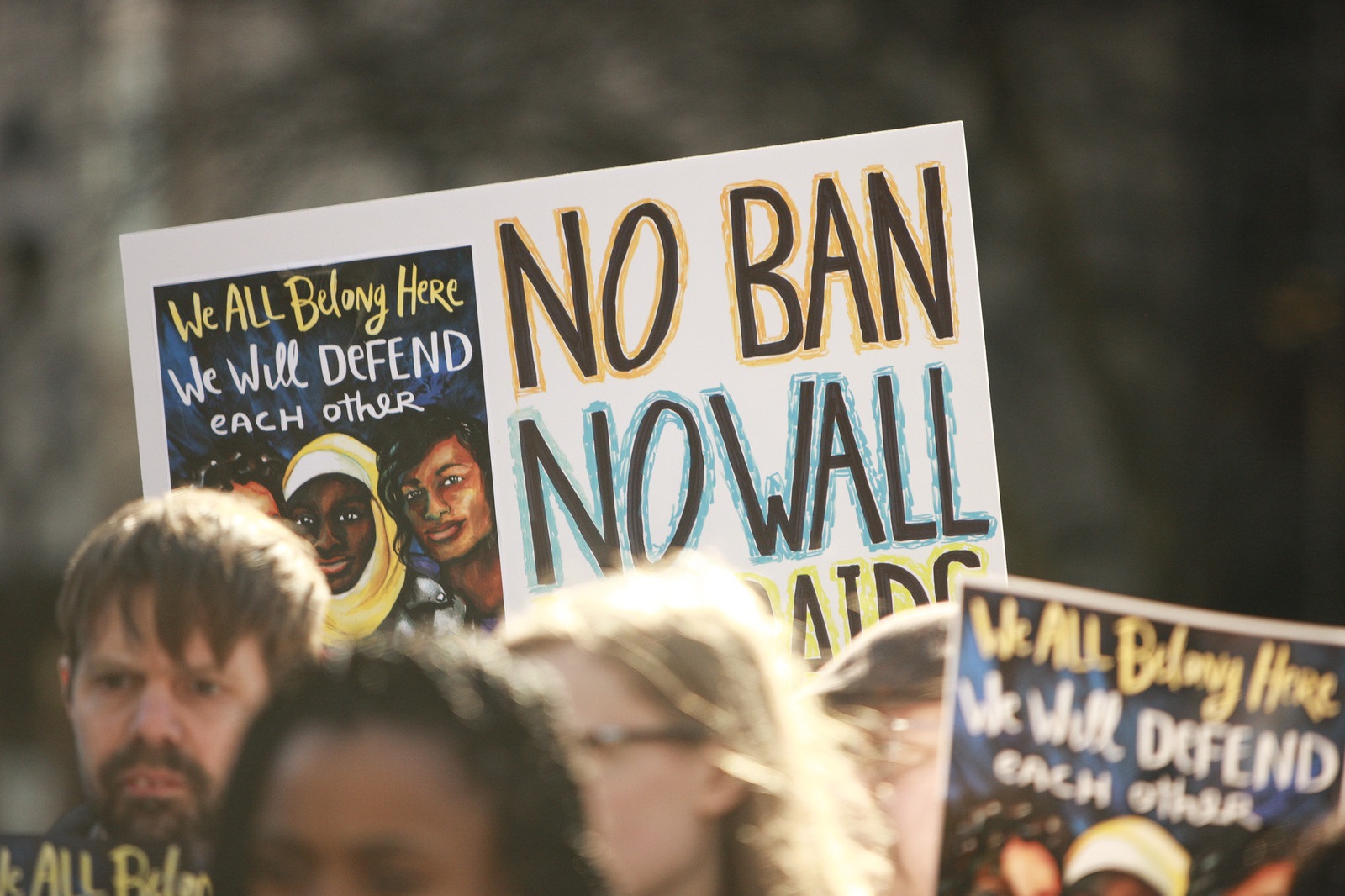
A 2018 protest in Indianapolis that marked the one-year anniversary of the Muslim ban enacted during the first Trump administration. Larry Gindhart
The Trump administration has issued a new travel ban—an executive order barring people from traveling to the U.S. from Afghanistan, Myanmar, Chad, the Republic of the Congo, Equatorial Guinea, Eritrea, Haiti, Iran, Libya, Somalia, Sudan, and Yemen. The ban also puts restrictions on people from Burundi, Cuba, Laos, Sierra Leone, Togo, Turkmenistan, and Venezuela.
The new order expands on the racist Muslim and Africa ban implemented during President Trump’s first term, which was later withdrawn by the Biden administration. The previous version inflicted severe harm on people around the world—separating families, stranding U.S. residents abroad, preventing students and professionals with visas from accessing schools and jobs, and fueling discrimination against Muslims and communities of color.
As a Quaker organization that recognizes the inherent dignity of every person, AFSC has long advocated for policies that welcome and protect all people. Barring people from the U.S. based on their country of origin is racist and immoral and must be categorically opposed.
This ban is part of the Trump administration’s coordinated assault on immigrants and people on the move that includes deportations, efforts to end permanent residency protections and birthright citizenship, and other xenophobic policies. Today, we must come together to stop these racist actions regardless of what form they take.
Here is what you need to know about the new travel ban.
1. The Trump administration has implemented a comprehensive travel ban affecting 19 countries.
On June 4, 2025, the Trump administration announced that it would bar or heavily restrict entry to the U.S. by citizens of 19 countries. Although earlier versions of the ban were struck down, the U.S. Supreme Court upheld a third version of a similar policy in 2018. The decision gave the president broad authority to restrict who enters the U.S.—a ruling that allowed the Trump administration to keep the racist, xenophobic, and Islamophobic policy in place.
2. Millions of people would be affected by the ban.
The ban would block millions of people from entering the U.S.—including people fleeing violence, family members seeking reunification, patients needing medical treatment, and students and professionals pursuing education and employment. Its impacts would extend beyond those seeking entry to include U.S. residents now cut off from loved ones abroad.
During the last Trump administration, Muslims, immigrants, and communities of color faced a rise in incidents of intimidation, bias, and violence. The new travel ban will legitimize the targeting of these groups for heightened discrimination.
While the previous Trump administration created “waivers” ostensibly allowing some people from banned countries to enter the U.S., the process was largely meaningless in practice. Most applications were denied, and the process was cumbersome and confusing—leading one Supreme Court justice to describe it as “window dressing.”
3. The administration is using the travel ban to further deny protection for people from countries experiencing war, natural disasters, or other humanitarian crises.
The ban specifically targets multiple countries that the U.S. has recognized as facing severe humanitarian crises through Temporary Protected Status (TPS) designations. That includes Afghanistan, Somalia, Congo, Yemen, Sudan, Haiti, and Myanmar—where the U.S. has acknowledged conditions that would prevent citizens from safely returning. The ban is especially egregious in the case of Sudan, which the U.S. State Department itself recognized last year as experiencing genocide.
The travel ban creates a cruel contradiction: The U.S. government simultaneously recognizes that conditions in these countries make them too unstable for return while denying entry to those seeking safety.
In addition, the ban would impact refugees from Afghanistan, including people who worked with the U.S. and coalition forces and face threats from the Taliban. At least 40,000 Afghans are still seeking asylum in the U.S., and this could place all of them at risk.
4. The travel ban is part of a broader anti-immigrant agenda.
Since taking office, the Trump administration has issued multiple executive orders to dismantle the U.S. immigration system. The travel ban is one part of that strategy that includes:
- Expanding deportations across the U.S. and instituting aggressive arrest quotas for Immigration and Customs Enforcement (ICE).
- Withholding federal funds and implementing other punitive measures against cities and states that limit federal cooperation with ICE.
- Closing the U.S. southern border to people seeking asylum and declaring a national border emergency to deploy more troops and further militarize border communities.
- Suspending the refugee program.
- Attempting to revoke citizenship from some U.S.-born children of immigrants.
All of these actions are linked and must be opposed. Read more about these attacks on immigration.
5. Join AFSC in taking action to stop the ban.
When the Muslim ban was introduced during the first Trump administration, hundreds of thousands of people protested at airports and in cities and towns across the U.S. We urge everyone to act with similar urgency now.
AFSC is calling on Congress to pass the NO BAN Act. This bill would prevent bans on people based on religious belief by strengthening the Immigration and Nationality Act. It would also require that any entry restrictions be narrowly tailored, evidence-based, and subject to appropriate consultation with Congress.
Every person deserves to live free from hatred and to practice their faith without fear. Join AFSC in declaring unequivocally: The travel ban has no place in our society—not now, not ever.
Contact your members of Congress today. Call the Capitol Switchboard: (202) 224-3121 and ask for your representative. Urge them to speak out against the travel ban and support the NO BAN Act!
